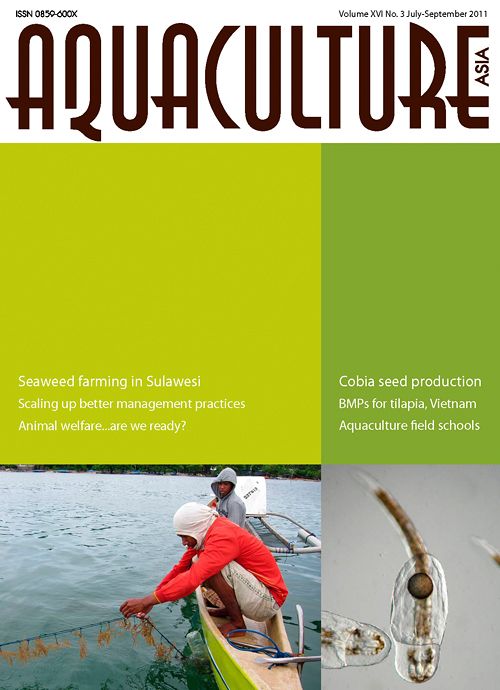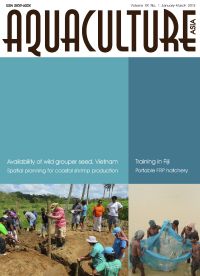Aquaculture Asia Magazine, July-September 2011
1 July 2011 | 1204 Downloads | .pdf | 6.02 MB | Better management practices, Emerging Global Issues, Freshwater finfish, Hatchery and nursery, Health and Biosecurity, India, Indonesia, Livelihoods, gender and social issues, Marine finfish, Aquatic plants, Education and Training, Vietnam
Editorial
- Coping with competition.
Simon Wilkinson
People in aquaculture
- Peter Edwards writes on rural aquaculture: Seaweed farming in Sulawesi, Indonesia
Aquatic animal health
- Scaling up better management practices: Empowering small scale farmers
Mohan, C.V.
Research and farming techniques
- Animal welfare (for farmed fish)…is Asia-Pacific ready?
Leaño, E.M. and Mohan, C.V. - Better management practices for tilapia cage farming in Tien Giang, Vietnam
Nguyen Ngoc Bao Tram, Phu Le Vo - Aquaculture field schools as an extension methodology
Radheyshyam, Saha, G.S. and De, H.K.
Marine finfish aquaculture network
- Successful seed production of Cobia, Rachycentron canadum, in India
Gopakumar, G., Rao, G.S., Nazar, A.K.A., Kalidas, C., Tamilmani, G., Sakthivel, M., Maharshi, V.A. and Rao, K.S.
NACA Newsletter
- 22nd Governing Council Meeting and a new Director General.
- NACA receives the Margarita Lizárraga Medal.
- NACA receives Gold Medal Award from the Asian Fisheries Society.
- Special address by Dr E.G. Silas at the inaugural session of the 22nd Governing Council Meeting 9-12 May, Kochi, India.
- Striped catfish farming in the Mekong Delta: A tumultuous path to a global success.
- Sign up for the NACA Email Newsletter.
- Diseases in Asian Aquaculture VIII: Registration and abstract submission open.
- Food safety and biosecurity.
- Ramping up adoption of catfish BMPs.
- Scaling up BMPs: A national workshop.
- 2nd Aquaclimate project meeting.
Creative Commons Attribution.

